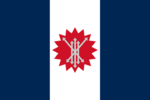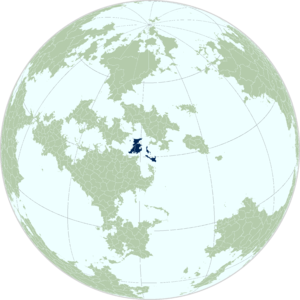Livaria: Difference between revisions
mNo edit summary |
(Government and politics) |
||
| Line 49: | Line 49: | ||
Livaria is the 11th most populous state on Gotha, with 123,816,597 inhabitants as of 7690, as well as the third most densely populated. The Greater Rubizhne Metropolitan Area, colloquially known as the 'Rubokruh', is one of the largest urban metropoleis in the world. The nation was one of the leaders of the industrial revolution of the 7300s and has since then remained a foremost economic power. Livaria has the third-largest economy by nominal gross domestic product (GDP) in the world and has amongst the highest GDP per capita and standards of living on Gotha. Its economy is dominated by the services sector, but it has a large and highly developed electronics and manufacturing sector which makes it one of the world's largest importers and exporters. It also has a significant research and development sector. | Livaria is the 11th most populous state on Gotha, with 123,816,597 inhabitants as of 7690, as well as the third most densely populated. The Greater Rubizhne Metropolitan Area, colloquially known as the 'Rubokruh', is one of the largest urban metropoleis in the world. The nation was one of the leaders of the industrial revolution of the 7300s and has since then remained a foremost economic power. Livaria has the third-largest economy by nominal gross domestic product (GDP) in the world and has amongst the highest GDP per capita and standards of living on Gotha. Its economy is dominated by the services sector, but it has a large and highly developed electronics and manufacturing sector which makes it one of the world's largest importers and exporters. It also has a significant research and development sector. | ||
The constitution of modern Livaria is governed by the Regal Compromise of | The constitution of modern Livaria is governed by the Regal Compromise of 7386, which sought to reconcile the position of the elected king with other republican traditions, and transformed the country into a constitutional parliamentary monarchy. Some political scientists have described Livaria's system of govenrment as a crowned republic. The head of state of the Regal Republic is the King (or Queen)-elect, a noble elected to the office for life, while the head of government is the Chancellor, who wields de facto executive authority in the country. Livaria is governed under a bicameral parliament, made up of the Noble Assembly (the upper house) and the Council (the lower house), mostly known as the Rada. | ||
Livaria is a [[Great Power]] and one of the [[Nuclear Five]]. It has one of the most technologically advanced and capable armed forces in the world, with a large blue-water navy and a number of military bases across the planet in the country's various overseas territories as well as allied nations. Livaria is a prominent member of a number of international organisations, including [[ICoN]], [[OSSO]] and XXX. | Livaria is a [[Great Power]] and one of the [[Nuclear Five]]. It has one of the most technologically advanced and capable armed forces in the world, with a large blue-water navy and a number of military bases across the planet in the country's various overseas territories as well as allied nations. Livaria is a prominent member of a number of international organisations, including [[ICoN]], [[OSSO]] and XXX. | ||
==Government and politics== | |||
Modern Livaria is a unitary parliamentary monarchical republic. The modern system, also sometimes referred to as a crowned republic, has come about over hundreds of years of evolution from complex forms of mixed government, which sought to combine and reconcile monarchy, aristocracy and democratic traditions. Modern Livaria nevertheless has strongly embedded democratic and republican ideals, though given its traditionally mixed form of government, aristocratic and monarchical elements are still important parts of the constitution and political values of the country today. | |||
===Executive=== | |||
Since the Regal Compromise of 7386, the head of state is the King- or Queen-elect ([[Livarian language|Livarian]]: Коро́ль-оби́раний (''Korol-obiranyĭ''); Короле́ва-оби́раний (''Koroleva-obiranyĭ'')). The monarch-elect is elected by universal suffrage and holds the post for life, though there is precedent for abdications. Upon the death of the previous monarch-elect, the Noble Assembly convenes and an elective council of 50 members is drawn by lot. Those 50 members then elect five candidates, which are then put forward to a universal suffrage vote, using a two-round election process. This system has evolved through various reforms in recent centuries, and was considerably more complex and less democratic in previous eras. | |||
The monarch-elect's powers are today broadly ceremonial, but they retain important appointment powers within the Noble Assembly. However, the monarch-elect also has a number of reserve powers at their disposal, which are rarely used, to uphold responsible government and prevent constitutional crises, including by dissolving parliament. The monarch-elect is also the commander-in-chief of the Livarian armed forces. | |||
The head of government is the chancellor, who is appointed by the monarch-elect conventionally after they are elected by the party or coalition with the most seats in the Rada, though this is not always the case. The chancellor, currently [[Eryka Vasylenko i Kolisnyk]], exercises executive power through the Cabinet of Ministers. | |||
===Legislature=== | |||
The legislature consists of the Livarian parliament, a bicameral body made up of the appointed upper house, the Noble Assembly, and the elected lower house, the Council, also known as the Rada. | |||
===Administrative divisions=== | |||
===Foreign relations=== | |||
===Dependencies=== | |||
===Law and justice=== | |||
===Military=== | |||
[[Category:Anaria]][[Category:Countries]][[Category:Livaria| ]] | [[Category:Anaria]][[Category:Countries]][[Category:Livaria| ]] | ||
Revision as of 04:10, 10 October 2023
| The Regal Republic of Livaria Королівська Республіка Ліварії (Livarian) | |
| Flag | Coat of arms |
|---|---|

|

|
| Motto: | |
| Anthem: Arise from the Sea, O Child of Vind! (Livarian: Вставай з моря, дитино Віндру!) | |
| Locator map | |

| |
| Capital city | Rubizhne |
| Largest city | Rubizhne |
| Official language | Livarian |
| Other languages | Medovenian, Vordinian |
| Ethnic group | |
| Religion | Peratolian Orkanan, Mellanhand Orkanan |
| Demonym(s) | Livarian or Livaryan |
| Government | |
| Government Type | Unitary parliamentary monarchical republic |
| King-elect | Yaromyr III |
| Chancellor | Eryka Vasylenko i Kolisnyk |
| Legislature | Noble Assembly (upper house) Rada (lower house) |
| Establishment | |
| Regal Republic established | |
| Area | |
| Total | 397,190.13 km2 |
| Population | |
| Total | 123,816,597 (11th) |
| Density | 311.73/km2 |
| Economy | |
| Economy type | Open-market capitalist |
| GDP (total) | Ꞡ 4.49 trillion |
| GDP per capita | Ꞡ 36,304.76 |
| Currency | Livarian Voran (฿) () |
| Other information | |
| Driving side | left |
| Calling code | LIV |
| Internet code | .li |
Livaria (Livarian: Ліваря), officially the Regal Republic of Livaria (Livarian: Королівська Республіка Ліварії; Korolivs'ka Respublika Livariyi), and often referred to eponymously as The Regal Republic, is a unitary parliamentary monarchical republic in north-eastern Anaria. The nation encompasses the Cheltic Isles, namely Livarskiy, Belohor and Zolotar islands. The islands are sandwiched off the north-eastern coast of Anaria Major, the eastern coast of Thultannia and the southern coast of Stoldavia, controlling the strategic straits that lead to the North Settant Sea and the Stolvic Ocean beyond. The country shares maritime borders with Halland and Auresia to the west, Zelezmia to the south, Helreich to the east and the United Royal Provinces to the north. Rubizhne is the nation's capital and largest city, followed by Rivnya, Zra-Rostyslav, Uzherehins'ke, Chervone and Andrushivka. The total area of Livaria, excluding its overseas territories, is 397,190 km2.
Livaria is the 11th most populous state on Gotha, with 123,816,597 inhabitants as of 7690, as well as the third most densely populated. The Greater Rubizhne Metropolitan Area, colloquially known as the 'Rubokruh', is one of the largest urban metropoleis in the world. The nation was one of the leaders of the industrial revolution of the 7300s and has since then remained a foremost economic power. Livaria has the third-largest economy by nominal gross domestic product (GDP) in the world and has amongst the highest GDP per capita and standards of living on Gotha. Its economy is dominated by the services sector, but it has a large and highly developed electronics and manufacturing sector which makes it one of the world's largest importers and exporters. It also has a significant research and development sector.
The constitution of modern Livaria is governed by the Regal Compromise of 7386, which sought to reconcile the position of the elected king with other republican traditions, and transformed the country into a constitutional parliamentary monarchy. Some political scientists have described Livaria's system of govenrment as a crowned republic. The head of state of the Regal Republic is the King (or Queen)-elect, a noble elected to the office for life, while the head of government is the Chancellor, who wields de facto executive authority in the country. Livaria is governed under a bicameral parliament, made up of the Noble Assembly (the upper house) and the Council (the lower house), mostly known as the Rada.
Livaria is a Great Power and one of the Nuclear Five. It has one of the most technologically advanced and capable armed forces in the world, with a large blue-water navy and a number of military bases across the planet in the country's various overseas territories as well as allied nations. Livaria is a prominent member of a number of international organisations, including ICoN, OSSO and XXX.
Government and politics
Modern Livaria is a unitary parliamentary monarchical republic. The modern system, also sometimes referred to as a crowned republic, has come about over hundreds of years of evolution from complex forms of mixed government, which sought to combine and reconcile monarchy, aristocracy and democratic traditions. Modern Livaria nevertheless has strongly embedded democratic and republican ideals, though given its traditionally mixed form of government, aristocratic and monarchical elements are still important parts of the constitution and political values of the country today.
Executive
Since the Regal Compromise of 7386, the head of state is the King- or Queen-elect (Livarian: Коро́ль-оби́раний (Korol-obiranyĭ); Короле́ва-оби́раний (Koroleva-obiranyĭ)). The monarch-elect is elected by universal suffrage and holds the post for life, though there is precedent for abdications. Upon the death of the previous monarch-elect, the Noble Assembly convenes and an elective council of 50 members is drawn by lot. Those 50 members then elect five candidates, which are then put forward to a universal suffrage vote, using a two-round election process. This system has evolved through various reforms in recent centuries, and was considerably more complex and less democratic in previous eras.
The monarch-elect's powers are today broadly ceremonial, but they retain important appointment powers within the Noble Assembly. However, the monarch-elect also has a number of reserve powers at their disposal, which are rarely used, to uphold responsible government and prevent constitutional crises, including by dissolving parliament. The monarch-elect is also the commander-in-chief of the Livarian armed forces.
The head of government is the chancellor, who is appointed by the monarch-elect conventionally after they are elected by the party or coalition with the most seats in the Rada, though this is not always the case. The chancellor, currently Eryka Vasylenko i Kolisnyk, exercises executive power through the Cabinet of Ministers.
Legislature
The legislature consists of the Livarian parliament, a bicameral body made up of the appointed upper house, the Noble Assembly, and the elected lower house, the Council, also known as the Rada.